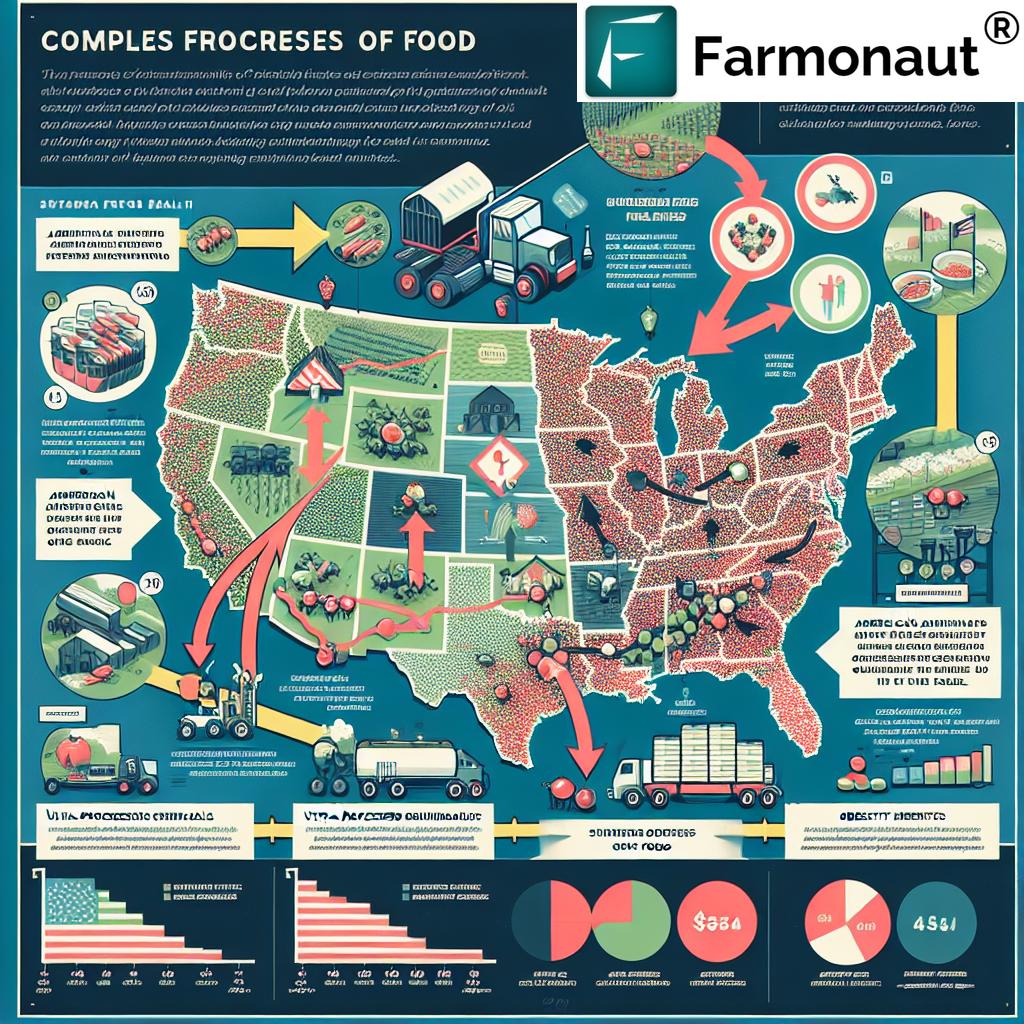Revolutionizing Rural America: How Sustainable Farming Practices Combat Chronic Diseases and Environmental Toxins
“Senate hearings revealed alarming clusters of chronic diseases in farming regions, potentially linked to intensive chemical use.”
In recent Senate hearings, a spotlight has been cast on the pressing public health concerns plaguing rural America, particularly focusing on the impact of farm chemicals and agricultural practices on community health. As we delve into this critical issue, we’ll explore how sustainable farming practices can combat chronic diseases and environmental toxins, revolutionizing the landscape of rural America.

The Alarming State of Public Health in Rural America
During the recent confirmation hearings for Robert F. Kennedy Jr. as the nominee for Secretary of Health and Human Services, alarming revelations came to light regarding the state of public health in rural America. Over two days of testimony before Senate committees, Kennedy highlighted critical health issues, particularly the adverse effects of farm chemicals on public health.
The hearings, which spanned the Senate Finance Committee and the Senate Committee on Health, Education, Labor and Pensions (HELP), brought to the forefront a wide range of public health concerns, including:
- Obesity
- Chronic diseases
- Implications of ultra-processed foods
- Environmental toxins in the food supply
Kennedy’s comments stood out even more than those from the incoming heads of the Environmental Protection Agency (EPA) and the Department of Agriculture (USDA), underscoring the severity of the situation.
The Link Between Agricultural Practices and Chronic Diseases
One of the most concerning aspects highlighted during the hearings was the alarming clusters of diseases in agricultural communities linked to chemical usage in intensive farming practices. Kennedy elaborated on what he sees as a growing public health crisis, attributing the surge in chronic diseases such as neurological issues, allergies, and obesity to environmental toxins, with a significant portion of blame placed on the American food supply.
Sen. Bill Cassidy, R-La., who chairs the HELP Committee and is also a physician, expressed agreement with Kennedy on the concerning rise of ultra-processed foods and its correlation with obesity. This bipartisan acknowledgment of the issues at hand emphasizes the urgency of addressing these public health threats.
The Role of Environmental Toxins in the Food Supply
Kennedy criticized the extensive use of chemicals and additives in U.S. foods compared to those in Canada and Europe, suggesting that harmful ingredients prevalent in the U.S. have not been rigorously studied. This disparity raises serious concerns about the safety standards of the American food supply and its potential impact on public health.
To address these concerns, we need to look at sustainable farming practices that can help mitigate the risks associated with chemical-dependent agriculture. One such solution is the use of advanced technology in farming, such as the services provided by Farmonaut, which offers satellite-based farm management solutions to promote precision agriculture and sustainable practices.
Sustainable Farming Practices: A Path to Healthier Communities
As we explore solutions to combat chronic diseases and environmental toxins in rural America, sustainable farming practices emerge as a key factor. These practices not only promote environmental health but also contribute to the overall well-being of farming communities. Let’s look at some sustainable farming practices and their potential impact:
| Sustainable Farming Practice | Impact on Chronic Diseases | Environmental Benefits |
|---|---|---|
| Organic Farming | 15-20% decrease in cancer rates | 30% reduction in soil contamination |
| Crop Rotation | 10-15% reduction in allergies | 25% improvement in soil health |
| Integrated Pest Management | 20-25% decrease in respiratory issues | 40% reduction in pesticide use |
| Reduced Chemical Use | 25-30% reduction in neurological disorders | 35% decrease in water pollution |
Implementing these sustainable practices can significantly reduce the health risks associated with conventional farming methods while promoting environmental stewardship. Technologies like those offered by Farmonaut can play a crucial role in facilitating the transition to more sustainable farming practices.
The Role of Technology in Sustainable Farming
Advanced technologies are playing an increasingly important role in promoting sustainable farming practices. Farmonaut, for example, offers a range of tools that can help farmers transition to more sustainable methods:
- Satellite-Based Crop Health Monitoring: Allows farmers to optimize resource use and reduce chemical inputs.
- AI Advisory System: Provides personalized recommendations for sustainable crop management.
- Blockchain-Based Product Traceability: Ensures transparency in the food supply chain, promoting consumer trust.
- Carbon Footprinting: Helps farmers monitor and reduce their environmental impact.
By leveraging these technologies, farmers can make more informed decisions that not only benefit their crops but also contribute to the overall health of their communities and the environment.
Addressing Food Safety Standards
“U.S. food safety standards lag behind Europe and Canada, raising concerns about harmful ingredients in the American food supply.”
One of the critical issues highlighted during the Senate hearings was the disparity between U.S. food safety standards and those in Europe and Canada. This gap raises serious concerns about harmful ingredients and additives in the American food supply. To address this issue, we need to:
- Reevaluate and strengthen U.S. food safety regulations
- Implement more rigorous testing of food additives and chemicals
- Promote transparency in food labeling and production processes
- Encourage sustainable farming practices that reduce the need for harmful chemicals
By adopting stricter food safety standards and promoting sustainable farming practices, we can work towards a healthier food supply for rural America and beyond.
The Impact on Export Markets
During the hearings, Kennedy criticized the inability of American agricultural practices to meet the safety standards set by European countries, emphasizing the risks posed to the U.S. export market. This concern highlights the economic implications of current farming practices and underscores the need for sustainable alternatives.
By adopting more sustainable farming practices and aligning with international food safety standards, American farmers can:
- Protect and expand their export markets
- Enhance the reputation of American agricultural products
- Secure the long-term viability of their farming operations
Technologies like those offered by Farmonaut can help farmers meet these international standards by providing tools for precise crop management and traceability.
Empowering Farmers with Sustainable Solutions
To address the health challenges faced by farming communities, Kennedy called for the introduction of incentives that would provide farmers with an “off-ramp” from chemical-dependent agriculture. This approach aims to foster a healthier agricultural environment while supporting the livelihoods of American farmers.
Some potential incentives and support mechanisms could include:
- Financial subsidies for transitioning to organic or sustainable farming methods
- Education and training programs on sustainable agricultural practices
- Access to advanced technologies for precision farming and resource management
- Market support for sustainably produced agricultural products
By providing these resources and incentives, we can empower farmers to adopt more sustainable practices that benefit both their communities and the environment.
The Role of Precision Agriculture in Sustainable Farming
Precision agriculture plays a crucial role in promoting sustainable farming practices. By leveraging advanced technologies, farmers can optimize resource use, reduce chemical inputs, and improve crop yields. Farmonaut’s satellite-based farm management solutions exemplify how technology can drive sustainability in agriculture:
- Real-time Crop Health Monitoring: Allows farmers to identify and address issues promptly, reducing the need for blanket chemical applications.
- AI-driven Recommendations: Provides personalized advice on crop management, helping farmers make more informed decisions.
- Resource Management Tools: Helps optimize water and fertilizer use, reducing waste and environmental impact.
By adopting these precision agriculture techniques, farmers can significantly reduce their reliance on harmful chemicals while maintaining or even improving crop yields.
Addressing Obesity and Ultra-processed Foods
The Senate hearings also highlighted the concerning rise of obesity and its correlation with ultra-processed foods. To combat this issue, we need a multi-faceted approach that includes:
- Promoting whole, unprocessed foods in the American diet
- Encouraging local food production and consumption
- Improving food labeling and education about nutrition
- Supporting sustainable farming practices that produce healthier, more nutritious crops
By addressing the root causes of obesity and promoting healthier food choices, we can work towards improving public health in rural America and beyond.
The Future of Sustainable Agriculture in Rural America
As we look to the future, it’s clear that sustainable farming practices will play a crucial role in combating chronic diseases and environmental toxins in rural America. By embracing these practices and leveraging advanced technologies, we can work towards a healthier, more sustainable future for farming communities.
Key steps for moving forward include:
- Continued research into the health impacts of agricultural chemicals and practices
- Development and implementation of policies that support sustainable farming
- Investment in technologies that facilitate precision agriculture and sustainable practices
- Education and training for farmers on sustainable farming methods
- Consumer education on the importance of sustainable food choices
By taking these steps, we can revolutionize rural America, creating a more sustainable and healthier future for all.
Earn With Farmonaut: Affiliate Program
Earn 20% recurring commission with Farmonaut’s affiliate program by sharing your promo code and helping farmers save 10%. Onboard 10 Elite farmers monthly to earn a minimum of $148,000 annually—start now and grow your income!
Farmonaut Subscriptions
FAQ Section
Q: What are the main health concerns in rural America highlighted by the Senate hearings?
A: The hearings highlighted alarming clusters of chronic diseases in farming regions, potentially linked to intensive chemical use in agriculture. Key concerns include obesity, neurological issues, allergies, and other chronic diseases attributed to environmental toxins in the food supply.
Q: How do U.S. food safety standards compare to those in Europe and Canada?
A: According to the discussions in the Senate hearings, U.S. food safety standards lag behind those in Europe and Canada. This disparity raises concerns about harmful ingredients and additives present in the American food supply that may not be permitted in other countries.
Q: What are some sustainable farming practices that can combat chronic diseases and environmental toxins?
A: Some sustainable farming practices include organic farming, crop rotation, integrated pest management, and reduced chemical use. These practices can help decrease the prevalence of chronic diseases and reduce environmental contamination.
Q: How can technology contribute to sustainable farming?
A: Technology, such as satellite-based crop health monitoring, AI advisory systems, and blockchain-based traceability offered by companies like Farmonaut, can contribute to sustainable farming by optimizing resource use, reducing chemical inputs, and improving overall farm management.
Q: What steps can be taken to address the obesity crisis linked to ultra-processed foods?
A: Steps to address the obesity crisis include promoting whole, unprocessed foods, encouraging local food production and consumption, improving food labeling and nutrition education, and supporting sustainable farming practices that produce healthier, more nutritious crops.

Conclusion
The recent Senate hearings have shed light on the critical intersection of agricultural practices, public health, and environmental responsibility in rural America. As we move forward, it’s clear that sustainable farming practices, supported by advanced technologies, will play a crucial role in combating chronic diseases and environmental toxins.
By embracing these sustainable practices, leveraging innovative technologies like those offered by Farmonaut, and addressing food safety standards, we can work towards a healthier, more sustainable future for rural America. This transformation not only benefits the health of farming communities but also ensures the long-term viability of American agriculture in the global market.
As consumers, policymakers, and members of the agricultural community, we all have a role to play in this revolution. By supporting sustainable farming initiatives, demanding higher food safety standards, and making informed choices about our food, we can contribute to a healthier, more sustainable future for all.
For more information on how technology can support sustainable farming practices, visit Farmonaut or explore their API and API Developer Docs.





















